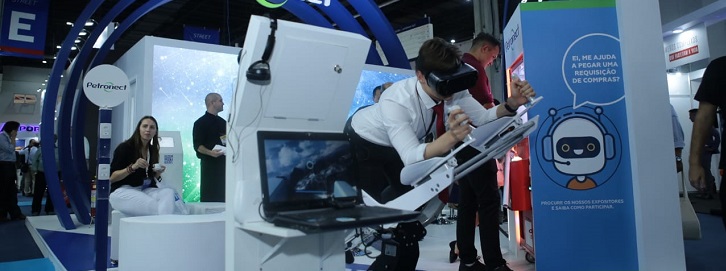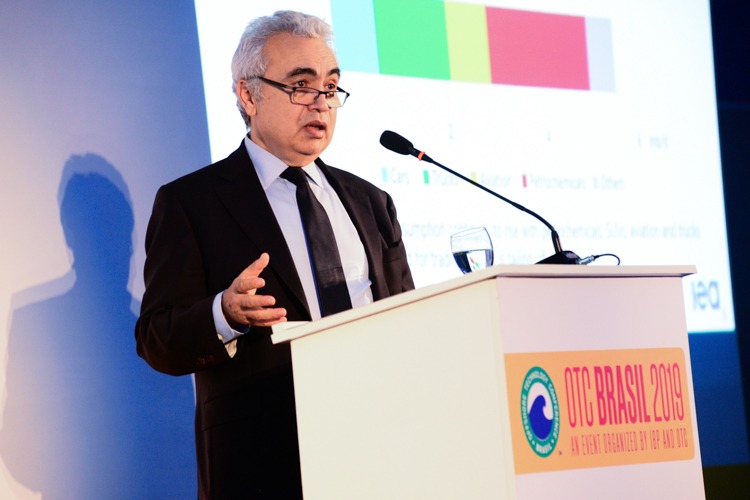Diretor geral da AIE exalta feitos do Brasil no pré-sal

Desafios da indústria offshore foram destaque na programação da tarde do primeiro dia da quinta edição da OTC Brasil
Alguns dos principais desafios da indústria offshore foram abordados na tarde do primeiro dia da OTC Brasil 2019, de transição energética ao desenvolvimento de campos de gás, passando pela crescente demanda por inovação com vistas à transformação digital e, principalmente, à redução de custos em águas profundas. O diretor geral da Agência Internacional de Energia (AIE), Fatih Birol, não perdeu a oportunidade, porém, de exaltar os feitos do Brasil no pré-sal. Ele foi o destaque do primeiro almoço-palestra da conferência, cujo tema era justamente a transição para um modelo energético menos intensivo em carbono.

Birol comentou que, no final de 2018, o Brasil se tornou um exportador de energia, o que significa a recuperação de décadas de dependência de importações. “Ouvimos falar do shale americano o tempo todo, mas não ouvimos falar sobre o Brasil ser um exportador de energia. É uma conquista rara e histórica. Sejam justos e orgulhosos da história de vocês, pois é um enorme sucesso – mostra que políticas podem mudar e que as políticas e incentivos certos para a indústria podem mudar o cenário, tornando a economia e a indústria de energia do país muito mais sustentáveis”, afirmou.
Segundo o executivo, a demanda global de energia cresceu 2,3% em 2018, o que significa o ritmo mais rápido desta década. De acordo com os dados da AIE, o gás natural sozinho representa cerca de 50% do crescimento da demanda global. O resultado foi impulsionado por uma economia global robusta, pelos fatores relacionados ao clima e também pelos preços moderados de energia. Ainda em um cenário global, Birol descartou um pico iminente na demanda de petróleo.
“Embora em um ritmo desacelerado, o consumo de petróleo continua aumentando, com os petroquímicos, os utilitários esportivos, a aviação e os caminhões assumindo a liderança. Nesse sentido, o Brasil desponta como uma fonte estratégica na produção global de petróleo, alcançando a segunda posição no ranking dos países que mais contribuirão para o crescimento da produção entre 2018 e 2030”, disse Birol. “A produção de petróleo do Brasil deve crescer fortemente, apoiada por mudanças no marco regulatório que atraem capital para desenvolver seus abundantes recursos. Se as condições forem adequadas, há um potencial ainda mais positivo”, completou.
Expectativa alta para o mercado de gás
Na plenária “Unlocking natural gas from offshore fields”, executivos das principais companhias internacionais de petróleo (IOCs) e da Petrobras reforçaram a grande expectativa para o crescimento do mercado de gás por conta do programa Novo Mercado do Gás, do Governo Federal. No entanto, todos ressaltaram a necessidade de estabelecer o quanto antes um marco regulatório para o segmento.
Representantes da Petrobras, Galp, BP, Equinor e Repsol destacaram que, por mais que o Brasil tenha potencial para crescer na produção e consumo de gás, são necessários elementos como melhor infraestrutura, preços reduzidos e garantia de demanda para aumentar a competitividade do país. De acordo com os executivos, a chegada de novos players no segmento de gás é extremamente positivo para o Brasil crescer no setor.
O secretário de Desenvolvimento Econômico do Rio de Janeiro, Lucas Tristão, afirmou que o estado está promovendo diversas iniciativas com o governo federal para a implantação do programa Novo Mercado de Gás no Rio de Janeiro. Segundo ele, o estado está trabalhando com base em pilares como: estimulo à competição, remoção de barreiras fiscais e integração com o setor elétrico.
“Acreditamos que o estado possa receber investimentos da ordem de R$ 50 bilhões somente em projetos de gás, com a geração de 10 mil empregos. Queremos tornar o Rio de Janeiro a capital da energia”, disse Tristão.
Brasil precisa induzir universidades a resolver problemas da indústria
Com representantes do governo, da academia, de grandes empresas e de startups, o painel “Levy Funds as a game changer in the Brazilian Offshore Industry”, que tratou das novas regras de aplicação dos recursos das participações governamentais em pesquisa e desenvolvimento, destacou a necessidade de as empresas, inclusive fornecedores, que agora poderão acessar tais recursos, assumirem maior protagonismo no direcionamento dos investimentos em inovação.
Para o consultor Thelmo Guiorzi, o país precisa induzir as universidades a resolverem problemas das empresas. Segundo ele, o modelo de investimento em pesquisa puxado pelas universidades está morto desde a década de 70, mas ainda é usado no Brasil. “Universidades precisam estar mais orientadas para problemas tecnológicos e de engenharia e menos para ciência pura. Isso precisa ser liderado pelas empresas”, disse.
Kazuo Nishimoto, da Universidade de São Paulo, também apresentou os modelos americano e japonês de inovação, desenvolvidos ainda na década de 50. Segundo ele, o sucesso desses países foi alavancado pelo sistema industrial, pela participação dos governos e também pelo alto nível educacional. No caso brasileiro, porém, ele defendeu a adoção de outro modelo.
“Inovação é mais do que orçamento. Precisamos empregar gente qualificada, encorajar o empreendedorismo, incentivar os spin offs e as startups”, afirmou, frisando que os projetos têm que ser baseados em missões com objetivos claros e participação de vários agentes da cadeia.
O presidente do Conselho da Ouro Negro Tecnologia, Arthur Braga, explicou que a PUC-Rio, de onde nasceu a empresa, e outras instituições de ensino se beneficiaram dos recursos para pesquisa e desenvolvimento do setor de óleo e gás. A falta de um sistema de venture capital estabelecido no Brasil, porém, atrapalha muitos desses empreendimentos.
Orlando Ribeiro, diretor de tecnologia da Petrobras, destacou o projeto da companhia com o Sebrae para evitar o “vale da morte” das startups do setor. Também falou sobre a importância de melhorar a estrutura de captação de recursos por essas empresas, o que pode ser feito por meio de fundos.
A Petrobras é a empresa que ainda detém o maior volume de recursos de participações governamentais para aplicação em P&D. Ribeiro destacou as novas regras aprovadas pela Agência Nacional de Petróleo, Gás Natural e Biocombustíveis (ANP), em agosto. A agência expandiu as despesas elegíveis, que também estão mais equilibradas entre os parceiros do projeto. Além disso, abriu mais espaço para projetos com universidades que atendam às demandas da indústria e o direcionamento a projetos prioritários, que tenham como meta resolver problemas específicos.
“Precisamos investir cada vez mais nos níveis mais altos, com foco nos desafios da indústria e não apenas apresentando o problema mais também mostrando quem será beneficiado”, disse.
Presença chinesa
Um dos destaques da exposição nesta quinta edição da OTC Brasil é a presença chinesa. O número de estandes do país mais que triplicou em relação à última edição, realizada em 2017. Incluiu ainda a presença de novatas, como a Munger International Petroleum Equipment e a VH-Marinetech Co.
“Participamos da OTC Houston e encontramos muitas empresas interessadas em nossos produtos. Acreditamos que o Brasil também é um grande mercado para a gente. Talvez, possamos andar juntos no futuro”, afirmou Hou Jiaojiao, gerente sênior de Marketing da VH-Marinetech Co.
Um desafio diferente: Enauta explora petróleo pesado em águas rasas na Bacia de Campos
Durante a sessão técnica “Atlanta Project – Heavy Oil and Ultra-Deepwater in Brazil” representantes da Enauta fizeram apresentações detalhadas sobre técnicas e equipamentos utilizados para enfrentar os desafios do campo de Atlanta e otimizar os resultados. Considerado um dos ambientes mais desafiadores, Atlanta é um campo de pós-sal localizado na Bacia de Campos, a 185 quilômetros da cidade do Rio de Janeiro, em lâmina d’água de aproximadamente 1.500 metros. Com três poços produtores, opera atualmente no Sistema de Produção Antecipada e recentemente alcançou um resultado expressivo com 30.462 barris de óleo por dia.
Os técnicos da Enauta, empresa que opera o bloco BS-4 em consórcio com a Barra Energia, elencaram os principais desafios de operação naquela região de características únicas (óleo pesado e viscoso, localização em um reservatório não consolidado e com baixo recobrimento sedimentar) e apresentaram as principais técnicas utilizadas, como a pioneira combinação de 2 BCS em série como método primário de elevação/back up, que vêm garantido sucesso na exploração e otimismo generalizado para a próxima etapa de um Sistema Definitivo.
A OTC Brasil conta com o patrocínio da Petrobras, Equinor, ExxonMobil, Shell, BP, Chevron, Petrogal, Total, Repsol Sinopec, TechnipFMC, Vallourec, PetroRio, Aker Solutions, Frank’s International, Maha Energy Brasil, Shawcor, Solvay, Halliburton, Enauta e MOL.
Acompanha aqui a cobertura da OTC Brasil 2019:
Dia 29: Abertura
Dia 31: Manhã, Tarde e Encerramento